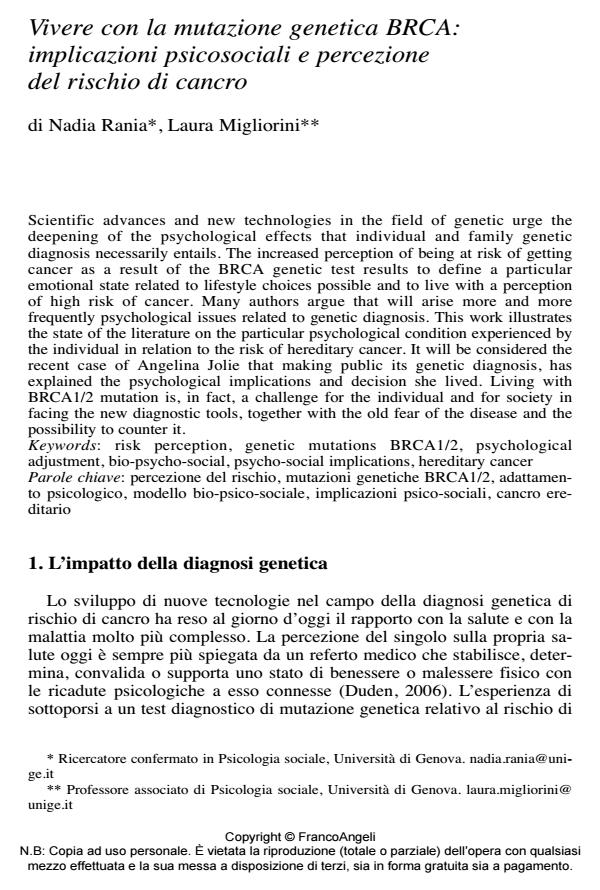Vivere con la mutazione genetica BRCA: implicazioni psicosociali e percezione del rischio di cancro
Titolo Rivista SALUTE E SOCIETÀ
Autori/Curatori Nadia Rania, Laura Migliorini
Anno di pubblicazione 2015 Fascicolo 2015/2
Lingua Italiano Numero pagine 14 P. 100-113 Dimensione file 82 KB
DOI 10.3280/SES2015-002008
Il DOI è il codice a barre della proprietà intellettuale: per saperne di più
clicca qui
Qui sotto puoi vedere in anteprima la prima pagina di questo articolo.
Se questo articolo ti interessa, lo puoi acquistare (e scaricare in formato pdf) seguendo le facili indicazioni per acquistare il download credit. Acquista Download Credits per scaricare questo Articolo in formato PDF

FrancoAngeli è membro della Publishers International Linking Association, Inc (PILA), associazione indipendente e non profit per facilitare (attraverso i servizi tecnologici implementati da CrossRef.org) l’accesso degli studiosi ai contenuti digitali nelle pubblicazioni professionali e scientifiche.
Scientific advances and new technologies in the field of genetic urge the deepening of the psychological effects that individual and family genetic diagnosis necessarily entails. The increased perception of being at risk of getting cancer as a result of the BRCA genetic test results to define a particular emotional state related to lifestyle choices possible and to live with a perception of high risk of cancer. Many authors argue that will arise more and more frequently psychological issues related to genetic diagnosis. This work illustrates the state of the literature on the particular psychological condition experienced by the individual in relation to the risk of hereditary cancer. It will be considered the recent case of Angelina Jolie that making public its genetic diagnosis, has explained the psychological implications and decision she lived. Living with BRCA1/2 mutation is, in fact, a challenge for the individual and for society in facing the new diagnostic tools, together with the old fear of the disease and the possibility to counter it.
Parole chiave:Percezione del rischio, mutazioni genetiche BRCA1/2, adattamento psicologico, modello bio-psico-sociale, implicazioni psico-sociali, cancro ereditario
- Women Face to Fear and Safety Devices During the COVID-19 Pandemic in Italy: Impact of Physical Distancing on Individual Responsibility, Intimate, and Social Relationship Rosa Parisi, Francesca Lagomarsino, Nadia Rania, Ilaria Coppola, in Frontiers in Public Health 622155/2021
DOI: 10.3389/fpubh.2021.622155 - How Could Self-Determination Theory Be Useful for Facing Health Innovation Challenges? Laura Migliorini, Paola Cardinali, Nadia Rania, in Frontiers in Psychology 1870/2019
DOI: 10.3389/fpsyg.2019.01870 - The Caregiving Experiences of Fathers and Mothers of Children With Rare Diseases in Italy: Challenges and Social Support Perceptions Paola Cardinali, Laura Migliorini, Nadia Rania, in Frontiers in Psychology 1780/2019
DOI: 10.3389/fpsyg.2019.01780
Nadia Rania, Laura Migliorini, Vivere con la mutazione genetica BRCA: implicazioni psicosociali e percezione del rischio di cancro in "SALUTE E SOCIETÀ" 2/2015, pp 100-113, DOI: 10.3280/SES2015-002008